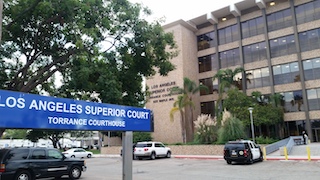If bail is requested in an amount more or less than the bail schedule amount and defendant is charged with a crime that relates to domestic violence, a noticed hearing must be held in open court. Penal Code § 1270.1(a). Two days of notice is required to the opposing party under 1270.1 to give the opposing party an opportunity to appear and oppose the bail deviation.
Penal Code § 1270.1 applies to both the misdemeanor and felony violations of the offenses listed in this statute. Dant v. Superior Court (1998) 61 Cal. App. 4th 380, 388-389, 71 Cal. Rptr. 2d 546 (upholding application of 1270.1 to misdemeanor violations of Penal Code § 273.5).
 Torrance Courthouse
Torrance Courthouse
If a defendant is charged with a serious felony, as defined under Penal Code § 1172.7(c), the victim must be given notice of a bail hearing and a reasonable opportunity to be heard at the hearing. Cal Const art I, § 28(f)(3).
At the hearing, in setting, reducing, increasing or denying bail, the judge must consider the following factors:
- Safety of the public and the victim. The protection of the public and the safety of the victim are the primary considerations in determining the amount of bail. Cal Const art I, § 28(f)(3) and Penal Code § 1275(a);
- Safety of the victim’s family. Cal Const art I, § 28(b)(3);
- Seriousness of the offense charged. Cal Const art I, §§ 12, 28(f)(3) and Penal Code § 1275(a). In weighing the seriousness of the offense, the judge must consider the alleged injury to the victim, the alleged threats to the victim or witness to the offense, the alleged use of a firearm or other deadly weapon in the commission of the offense, and the alleged use or possession of controlled substances by the defendant. Penal Code § 1275(b). If the defendant is charged with a narcotics offense (Health & Safety Code §§ 11350 – 11392), the judge must consider the alleged amount of the controlled substances involved in the commission of the offense and whether the defendant is currently released on bail for another narcotics violation. Penal Code § 1275(b).
- Previous criminal record of the defendant. Cal Const art I, §§ 12, 28(f)(3) and Penal Code § 1275(a); and
- Probability of defendant appearing at the trial or hearing of the case. Cal Const art I, §§ 12, 28(f)(3) and Penal Code § 1275(a).
In addition, it merits mention that before a defendant arrested for the alleged crimes may be released on bail in an amount that is either more or less than the amount in the bail schedule for the offense, or may be released on his or her own recognizance (OR), the judge must consider evidence of defendant making past court appearances, the maximum potential sentence that could be imposed, and the danger posed to other persons if defendant is released.
The judge must also consider any evidence offered by the defendant regarding his or her ties to the community and ability to post bond. Penal Code § 1270.1(c); see also In re Humphrey (2018) 17 Cal. App. 5th 1006, 228 Cal. Rptr. 3d 513 (when defendant is indigent or unable to post bail, a court must consider and make findings regarding a defendant’s ability to pay and consider less-restrictive alternatives to money bail pursuant to the Fourteenth Amendment and Cal Const art I, § 17).
For more information about bail, please click on the following articles:
 Torrance Courthouse
Torrance Courthouse